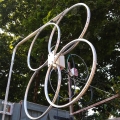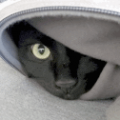rrobinet
I have configured several Kiwis for wifi access by attaching an inexpensive router configured as a Wifi client to the ethernet port of the Kiwi. This $25 TP Link has worked well for me:
https://smile.amazon.com/TP-Link-Wireless-Portable-Travel-Router/dp/B00TQEX8BO/ref=sr_1_14?keywords=tplink+wifi+router&qid=1548188019&sr=8-14
In principle one could enable the internal BB Wifi or attach a USB wifi adapter, but I am reluctant to fiddle with the Kiwi's OS.
About
- Username
- rrobinet
- Joined
- Visits
- 1,325
- Last Active
- Roles
- Member
- Points
- 9
-
IP connection to Kiwi through Kiwi's USB interface
SOLVED
I carefully read the "Using a USB network connection for initial Beagle access" section of the user manual but could access the Kiwi from a Win10 PC or from a Raspberry Pi
On the Kiwi, 'ifconfig' command lists usb0 with IP address 192.168.7.2 and MAC 40:bd:32:e5:40:02, and usb1 with IP 192.168.6.2 and MAC 1c:ba:8c:a2:ed:73
On the PC, when I plug in the USB cable from the Kiwi, a new DHCP network interface appears but that interface gets no IP address. The beaglebone documentation describes a drive which should appear as well, but Win 10 shows only this additional network interface with MAC 40:bd:32:e5:40:01. That MAC differs by 1 from the usb0 MAC on the Kiwi, so the PC and Kiwi are communicating.
On the Pi, when I plug in the USB cable from the Kiwi two new interfaces appear: eth2 with the same MAC 40:bd:32:e5:40:01 which is assigned to the PC interface, and eth1 with MAC 1c:ba:8c:a2:ed:72, but those Pi interfaces give themselves self-assigned IP address. Running 'tcpdump -i eth1' on the Pi I can see it sending out DHCP request packets but getting no response, so I infer that the BeagleBone is not responding to DHCP on those usb0/1 ports.
However, by configuring the Pi's eth1 and eth2 with static addresses I was able to gain complete ssh and GUI access to the Kiwi at both 192.168.6.2 and 192.168.7.2.
To manually configure those IP address on a Pi, add these four lines to /etc/dhcpcd.confpi@Berk-Pi4b-90:~ $ tail -4 /etc/dhcpcd.conf interface eth1 static ip_address=192.168.6.1/30 interface eth2 static ip_address=192.168.7.1/30 pi@Berk-Pi4b-90:~ $
I don't have a second Kiwi here to test a two Kiwi system, but it seems I could modify the usb0 address 192.168.7.2 in /etc/network/interfaces to 192.168.8.2 and configure the Pi to add a corresponding ethX with 192.168.8.1 -
WSPR internal kiwi decoder
I could imagine installing WD on a BBAI machine and dedicate a core to run it.
But synchronizing Kiwi and WD code upgrades would be a mess.
For example, just this week I was able to upgrade 20+ WD sites to use the wsprd in WSJT-x 2.2.1 which produces up to 6% more spots from the same antenna+Kiwi.
Also, many installations use 2 or more antenna+Kiwis, and embedding WD in one Kiwi would result in an asymmetric set of Kiwis.
So it is far better to run WD on a $35 Pi 3b (or better yet a 2/4Gb Pi 4) which can support 30+ channels of Kiwi bands. -
wsprdaemon - A Raspberry Pi WSPR decoding service
The new code is backwards compatible with earlier WD.conf and running installations.
WD extended spots are stored in a new TS table 'wsprdaemon_spots' on wsprdaemon.org and include high resolution frequency and DT spot values and include all the fields reported by 'wsprd' in ALL_WSPR.TXT.
The noise values now stored in 'wsprdaemon_noise' and now include a count of overload events reported by the Kiwi during the 2 minute long WSPR cycle.
I will be posting to http://wsprdaemon.org/forum.html about features and fixed to V2.9 -
Multiple Kiwis, single GPS antenna?
For over a year, at KPH I have fed 7 Kiwis from one GPS antenna on the roof: GPS Puck ====> 30M RG-6u =====> $15 passive splitter =====> 7 Kiwis
The 8-way I used is no longer offered, but I have installed this 6 way at other sites: https://smile.amazon.com/gp/product/B01KCY5MBU/ref=ppx_yo_dt_b_search_asin_title?ie=UTF8&psc=1
No mods are required on the Kiwis
I started with the Kiwi's GPS puck on the roof into this system and that worked fine, but replaced the puck with a 45 dB gain 'bullit' GPS antenna which I bought as a precaution against the losses
The 100' RG8 measured 8 dB loss at 1500 MHz and the splitter introduces 11 dB, but the rooftop location more than compensates for those losses

-
wsprdaemon - A Raspberry Pi WSPR decoding service
The noise graphs generated by v2.7 are no longer displayed by wsprdaemon.org
Also, in v2.7 there are some log files which for MERGed configurations can grow to overflow the file system.
Go to http://wsprdaemon.org for more information and links to additional resources for viewing your data



